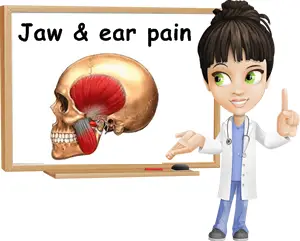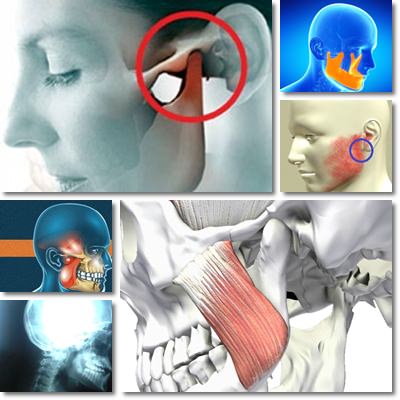A lot of us have often experienced debilitating jaw and ear pain, also known as mandibular pain or temporomandibular pain.
While the pain can make it incredibly difficult for one to eat and even talk properly, the condition is usually harmless and chances are it will resolve itself in a matter of weeks or months, depending on its gravity. Jaw and ear pain, or mandibular pain, usually occurs unannounced and may cause one to panic, thinking that maybe the jaw bone got stuck or something similar.
In my case, the pain took about 15 days to disappear and I got to resume my normal life immediately after.
However, it was not easy having to deal with it for two weeks and I had to be very careful not to stress the jaw even more than it already was with foods that required a lot of chewing, talking too much or resting my chin in the palm of my hand. But let me tell you about it.

I woke up one morning with a sort of clenched jaw sensation and experiencing quite a lot of pain in my lower jaw and ear area. Chewing, talking and any form of jaw movement was extremely difficult because of the pain. But the pain disappeared as soon as I closed my mouth and kept it shut. While my family would have loved to believe that it was a sign I was talking too much, what caused my mandibular pain was not so incredible after all. The night before I got myself several bags of sunflower seeds and enjoyed them while I was working at the computer. The continuous effort of trying to crack the seeds put a strain on my lower jaw and left it tense and hurting.
As I suspected, the pain came from a nerve inflammation as a result of my constant chewing. If you experience a similar pain in the jaw that leaves you unable to eat or talk properly, try placing a finger right below the ear lobe, where you might feel tension. Then open your mouth and you have found the inflammation point causing the pain. Gentle pressing might help alleviate the pain for the moment, but will not treat the problem.
Unless you have teeth alignment or existing jaw bone problems, experiencing pain in the area between your jaw and you ear is a sign of mandibular tension and possibly inflammation, called temporomandibular pain (it involves the temporal and mandible areas). It is important to see a doctor even though you may identify the cause of your jaw and ear pain yourself.

What causes jaw and ear pain?
Most of the time, mandibular pain is a harmless condition brought about by similarly harmless actions including, but not limited to poor posture or repetitive movements. See below my list of potential causes for jaw and ear pain:
- Chewing too hard or too much.
- Grinding teeth during sleep or while awake.
- Jaw clenching.
- Stress causing teeth grinding or jaw clenching.
- Bad posture (resting your chin in your hand for prolonged periods of time puts pressure on the jaw).
- Dental work that my alter normal bite (surgery, dentures).
- Consuming hard foods that require a lot of chewing.
- Injury (fracture, dislocation) or disease (chronic pain or fibromyalgia, osteoarthritis etc.). These are rare occurrences.
Signs and symptoms of jaw and ear pain
Symptoms of jaw and ear pain range from tension and pain to problems chewing and talking. Here are potential signs that accompany the jaw and ear pain:
- Pain starting from the lower jaw up to the ear lobe (mandible pain). Pain may also be experienced at the level of the cheek bone of the affected side.
- Tension in the lower jaw or jaw becoming stuck.
- Popping or clicking jaw.
- Problems closing mouth, chewing and talking.
- Tenderness of face muscles.
- Teeth pain, not localized, but generalized.
- Neck tension and pain, headaches.
- Buzzing or ringing ears.
- Depending on the severity of the pain, you might be experiencing sleep problems such as insomnia.
Jaw and Ear Pain Solutions And Treatment Options
What you can do about jaw and ear pain? While my experience with mandible pain was not very scary, I did have to take great care to ease the strain I usually put on my jaw and ear joint. And, luckily, I was back to my normal self in about two weeks. While the pain may take up to several months to completely disappear for some people, with a little luck and great care your condition might improve a lot faster. Find out the 5 best things you can do to ease jaw and ear pain:
- Apply dry, warm compresses alternating with cold compresses for several minutes a day.
- Eat soft foods: mashed potatoes, cauliflower, peas, etc.
- Avoid screaming or talking too much and opening the mouth all the way.
- Help relax the area by massaging it or moving it slowly.
- Avoid chewing gum, eating nuts, seeds, biting nails or spitting.
- Correct posture by avoiding resting your chin in the palm of your hand.
- Try not to clench the jaw or grind your teeth, if possible.
- While I did not use anti-inflammatory medication, your doctor might advise you in this direction.
Conclusion
The area from our lower jaw up to the ear lobe is a sensitive one and excessive chewing, resting the chin in the palm of our hand all the time, eating hard foods that require a lot of chewing, clenching our jaw or grinding our teeth can put a lot of strain on it, resulting in mandible pain and difficult use of the mouth. So make sure you are doing all you can to prevent potentially debilitating jaw and ear pain.
